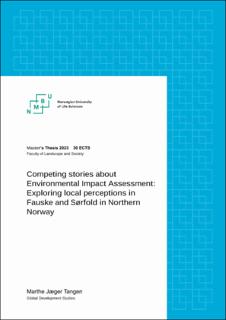| dc.description.abstract | The Environmental Impact Assessment (EIA), a widely recognized tool in environmental governance, plays a crucial role in assessing and determining the socio-environmental impacts in the license process for wind power projects in Norway. However, its influence has sparked controversies, due to asymmetrical cost-benefits considerations. This thesis uses a qualitative case methodology to unpack perceptions on EIAs at municipality level by focusing on a pre- licensing process in the municipalities of Fauske and Sørfold –Northern Norway – which was marked by conflicting views on a proposed implementation of an EIA for large-scale wind power. Through applying concepts from political ecology and decolonial theory, this thesis aims to explore how and why divergent ways of understanding the EIA unfold.
The findings reveal diverse interpretations of the EIA's capabilities, function, and purpose, as well as varying levels of confidence in the tool. My findings show that positive perceptions of the EIA stem from regarding the license process as an entrusted system where local decision-power is preserved, and participatory mechanisms generate inclusion. When coupled with an appreciation of nature as quantifiable through scientific lenses and positive to wind power, this seems to generate a view of the EIA as capable of identifying and measuring impacts in a nuanced manner. My findings further point out that perception of the EIA as unreliable is rooted in lack of confidence or insecurity in the license process, which represents a removal of local democracy and giving green light to wind power development. Moreover, opposing perceptions see the EIA is incapable of objectively addressing socio-environmental impacts and recognizing other ways of knowing. As a result, a refusal of the EIA is perceived as the beneficial way to protect irreplaceable nature and local influence.
In sum, my findings point out a number of EIA's multifaceted challenges across epistemological, structural, and political scales. Furthermore, the thesis argue that EIA-perceptions are influenced by broader narratives concerning climate change mitigation and knowledge spheres. The thesis contributes with improved insights into how and why EIAs create tensions in wind power license processes, moreover it emphasizes the need for an increased focus on epistemological tensions in environmental governance. | |
